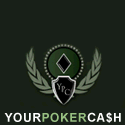
I play in some of the biggest cash games in the world. Usually, these games are loaded with pros - folks who know the intricacies and advanced strategies of pretty much every poker game. We normally play a mix of games that can include Hold ‘em, 7-Stud, Omaha, and one or more of the Hi/Lo variations. Most of the time, we play with a fixed-limit betting structure.
In a recent session, I had a stretch where I was pretty card dead, so I spent most of my time folding. To my knowledgeable opponents, it must have appeared that I was playing especially tight. Then in a game of 7-Stud, I was dealt an Ace as my up-card. The bring-in bet had been raised and I re-raised.
Then, two top-rate pros with no more than their antes in the pot called my re-raise. There are only a couple of hands that might justify their calls. However, as the hand proceeded with me as the aggressor, it became clear that the callers of my third-street re-raise didn't have much at all. One held three unconnected hearts, the other had a middle pair with no kicker.
What were these guys thinking? It's hard to know, but my guess is that one of them let his desire to gamble get the better of him. Though that can pay dividends in well-chosen spots, this wasn't one of them. The other might have thought he could outplay me later in the hand.
In the end, neither of their strategies makes much sense. I made it expensive enough that it was a lousy spot to gamble, and given that I've declared that I have a pair of aces, there's little chance that I'm going to get bluffed out of the pot.
I think this hand highlights a couple of the mental traps that sometimes snag advanced players. As players improve, they inevitably see more opportunities for profit, and thus, see potential in a greater number of hands. But it's a slippery slope, and a player can easily lose the long view and convince himself that he can make any starting hand work out.
This just isn't the case - especially when playing fixed-limit games. Even at the highest levels, profitability in limit poker is largely determined by a player's ability to choose the right starting hands. If you fail in this regard or somehow lose your discipline, it's nearly impossible to recover. Fancy plays and good decisions on later streets cannot overcome early-hand mistakes. If you're throwing money into a pot when you shouldn't, you're going to lose money. There's no way around it.
If you find yourself in a stretch where things aren't going especially well, take a step back and make sure your hand selection is all it ought to be. Review the previous tips from the other Full Tilt Poker pros. Jennifer Harman has written on hand selection in Stud-8, Omaha-8, Razz,and Perry Friedman has written about third street decisions in 7-Stud.
Always remember that in limit poker, hand selection is the foundation for your entire game. You can't build a solid game on a weak foundation.
Bonuses:
- Free $100 Bankroll at Full Tilt Poker
- 27% Rakeback at Full Tilt Poker
 First time I played at a Casino, it was pretty fun! I played $5/$10 limit..Ended up $57.50:) I hate limit, and every hand is like 6 way to the flop lol. Wish I hit one set.. The cool thing is, the casino is only 20min bike ride from my place so I can go there any time I want. There were so many different kind of poker games..including Three Card Poker which my friends liked.
First time I played at a Casino, it was pretty fun! I played $5/$10 limit..Ended up $57.50:) I hate limit, and every hand is like 6 way to the flop lol. Wish I hit one set.. The cool thing is, the casino is only 20min bike ride from my place so I can go there any time I want. There were so many different kind of poker games..including Three Card Poker which my friends liked.
 Four of the world's best online poker players take Vegas by storm in G4s newest original series, "Two Months. Two Million." These former high school math whizzes risk it all with their own money and have one goal in mind: win two million dollars in only two months. Its a high risk gamble you wont want to miss. Complicating their task are all the temptations of their new found Vegas lifestyle; the money, the women and a massive Las Vegas mansion. They have the brains to win if they can keep their minds on poker.
Four of the world's best online poker players take Vegas by storm in G4s newest original series, "Two Months. Two Million." These former high school math whizzes risk it all with their own money and have one goal in mind: win two million dollars in only two months. Its a high risk gamble you wont want to miss. Complicating their task are all the temptations of their new found Vegas lifestyle; the money, the women and a massive Las Vegas mansion. They have the brains to win if they can keep their minds on poker.  An interview with David Sklansky, the famous poker theorist, author among many works including "Theory of Poker". A conversation about theory, learning the game and it's possible future.
An interview with David Sklansky, the famous poker theorist, author among many works including "Theory of Poker". A conversation about theory, learning the game and it's possible future. 




 I play in some of the biggest cash games in the world. Usually, these games are loaded with pros - folks who know the intricacies and advanced strategies of pretty much every poker game. We normally play a mix of games that can include Hold ‘em, 7-Stud, Omaha, and one or more of the Hi/Lo variations. Most of the time, we play with a fixed-limit betting structure.
I play in some of the biggest cash games in the world. Usually, these games are loaded with pros - folks who know the intricacies and advanced strategies of pretty much every poker game. We normally play a mix of games that can include Hold ‘em, 7-Stud, Omaha, and one or more of the Hi/Lo variations. Most of the time, we play with a fixed-limit betting structure.
.gif)















